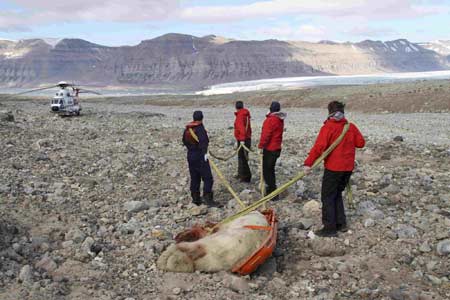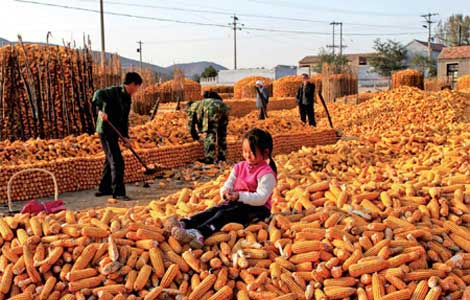Society
British teen slain by polar bear
Updated: 2011-08-06 16:12
(Agencies)
|
 People pull the remains of a 250kg male polar bear away from the scene after it was shot by a member of a group of British campers on the central island of Spitsbergen in Norway's Svalbard archipelago in the Arctic August 5, 2011. [Photo/Agencies] |
A polar bear attacked a group of British students camping on a remote Arctic glacier as part of a high-end adventure holiday, killing a 17-year-old boy and injuring four other young people Friday before a trip member fatally shot the bear.
Two were hospitalized with severe injuries, according to the British Schools Exploring Society, the organizer of the trip.
The attack took place on the Svalbard archipelago, which is home to about 2,400 people and 3,000 polar bears and attracts well-off and hardy tourists with stunning views of snow-covered mountains, fjords and glaciers.
The British Schools Exploring Society is affiliated with Britain's Royal Geographic Society and has run expeditions for young people to remote and challenging corners of the globe for at least 75 years.
Expedition members were spending three to five weeks in the Arctic, and had each paid 2,000 pounds (US$3,300) to 3,000 pounds (US$4,900) to join the trip, designed to mix science experiments with adventure.
Participants were hunting for Arctic fossils and taking part in environmental experiments, including a project to install hydro and solar power systems. The group also was clearing beaches of tidal debris.
Before heading to the Arctic, youngsters had been urged to raise their fitness levels to cope with the challenging terrain, and to prepare for a diet of freeze-dried meals.
The campers were in a group of 80 people, most of them between 16 and 23, the British Schools Exploring Society said. Many posed Wednesday for a final photo together before splitting into smaller groups to head out to more remote parts of the Arctic.
On Friday morning, some of the youths were camping on Spitsbergen Island, the largest in the Svalbard archipelago, and a place where researchers say there is not much food available for polar bears during the summer.
The bears, which can grow to around 10 feet (3 meters) and weigh up to 1,200 pounds (550 kilograms), are the world's largest non-aquatic predators. Although they don't usually hunt humans, they can attack nearly anything if they are hungry.
With their broad paws and claws as long as two inches (5.1 centimeters), polar bears are extremely dangerous and visitors to Svalbard are advised always to be armed, avoid confrontation and store smelly food securely.
The bear attacked a group of 13 people in the early morning, leaving them with moderate to severe wounds that included head injuries, officials said. One of the campers shot the bear, said Liv Asta Oedegaard, a spokeswoman for the Svalbard governor's office.
The injured were evacuated by helicopter to Tromsoe, the nearest city on the Norwegian mainland.
"With great sadness the British Schools Exploring Society confirms the tragic death this morning of one of the members of its expedition in Svalbard," said Edward Watson, chairman of the British Schools Exploring Society. He named the teen as Horatio Chapple, who hoped to study medicine.
"By all accounts, he would have made an excellent doctor," Watson said, adding that his thoughts were with the family.
The parents of the dead teenager have been informed and the names of the dead and injured would be released once Norwegian authorities had concluded investigations, he said.
Visitors are urged to carry high-powered rifles whenever venturing outside Longyearbyen. Polar bear safety brochures advise campers against setting up their tents in areas where bears roam.
Oedegaard said campers normally lay a tripwire around tents before they go to sleep. An emergency flare is triggered if an animal crosses the wire. It was unclear whether the British campers' wire had worked properly, she said.
"It is not unusual to camp here, but it is necessary to carry weapons," she said.
E-paper

My Chinese Valentine
Local businesses are cashing in on a traditional love story involving a cow herder and a goddess
Outdoor success
Lifting the veil
Allure of mystery
Specials

Sowing the seeds of doubt
The presence in China of multinationals such as Monsanto and Pioneer is sparking controversy

Lifting the veil
Beijing's Palace Museum, also known as the Forbidden City, is steeped in history, dreams and tears, which are perfectly reflected in design.

Beer we go
Early numbers not so robust for Beijing's first international beer festival
